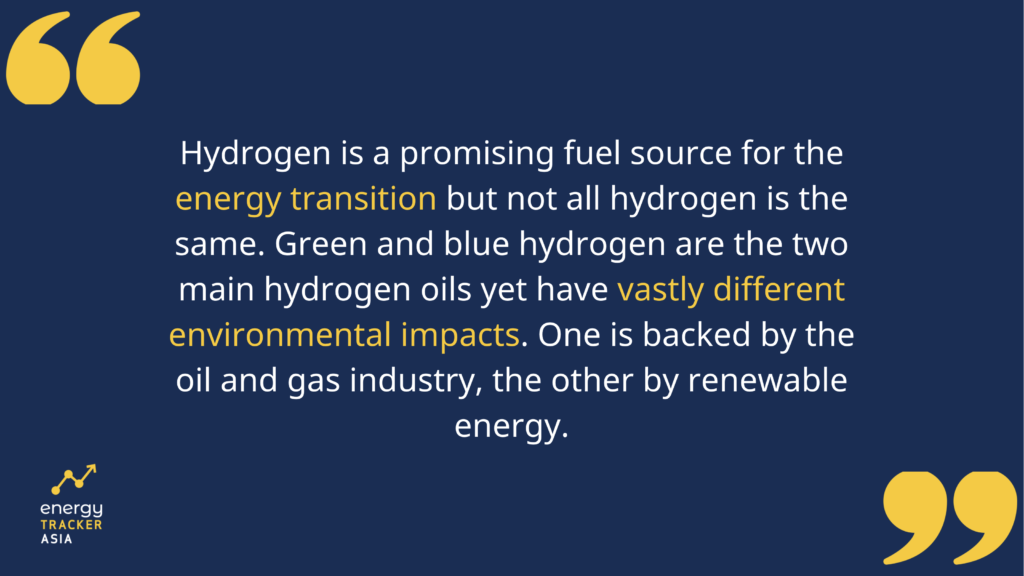Hydrogen Oil: Green vs Blue, What’s the Difference?
Source: Pacific Green Group
04 April 2024 – by Eric Koons Comments (0)
What’s the Difference Between Green Hydrogen Oil and Blue Hydrogen Oil?
Hydrogen is a promising fuel source for the energy transition, but not all hydrogen is the same. Green hydrogen and blue hydrogen are the two main types of hydrogen oils yet encompass vastly different environmental impacts.
With this large break in impacts, it should be no surprise that the oil and gas industry supports one type and climate supporters back the other.
The Future of Hydrogen Oil
Hydrogen has many potential applications in transportation and electricity generation – including cars, houses, portable power and others.
Yet, hydrogen oil is really only popular for industrial uses like petroleum refining, metal treatment, fertilizer production and food processing.
But we expect this to change in the coming decades.
The Environmental Benefits of Hydrogen
Increased use of hydrogen oil will be due to a variety of reasons, but a few of the key ones are related to its environmental benefits:
- Energy generated with hydrogen produces almost zero greenhouse gas emissions
- Hydrogen is a renewable resource
- Local production of hydrogen
- More efficient energy generation than fossil fuels
Beyond just environmental benefits, hydrogen is a high-efficiency energy resource.

Hydrogen Is a More Energy Dense Fuel Than Oil and Gas
Fossil fuels are still the most widely used energy source, so they make a great comparison to hydrogen oil.
Comparing similar volumes, hydrogen contains approximately three times more energy than oil and natural gas. This enables hydrogen fuel cells to be 2-3 times more efficient than internal combustion engines.
Additionally, with continual improvements in hydrogen fuel cells, they can be quickly recharged (averages less than 4 minutes for cars) and function independently of national grids (i.e., portable energy source).
The 7 Guiding Principles for Clean Hydrogen Energy Deployment
Read moreWhat Is Hindering This Transition?
Currently, the main challenges for hydrogen oils are:
- Lack of infrastructure: There are few pipelines dedicated and suitable to transport hydrogen.
- Cost: Fuel cell technology is costly, and hydrogen production is expensive compared to fossil fuels.
Luckily, these are the same issues that plague most new technologies, and costs almost always decrease as adoption, research, and investment increase.
Overall, the environmental and efficiency benefits make hydrogen sound like a realistic, glowing alternative energy solution. Unfortunately, not all hydrogen has these qualities, and it really depends on the production process.
What Is Green Hydrogen?
Green hydrogen production separates water into hydrogen and oxygen using renewable energy-powered electrolysis. Scientists believe that this technology can meet 24% of the world’s energy needs and significantly contribute towards net zero emissions by 2050.
As we said before, cost remains the major hurdle to reaching this level of adoption. The cost to produce 1 kilogram of green hydrogen oil ranges from USD 3 to USD 7, compared to approximately USD 1 when using fossil fuels.
Yet, recent cost trends predict production costs will range between USD 1 and $2 by 2050. Electrolysis costs (which have dropped 50% over the past five years), predicted advances in fuel cell technology, and governments developing hydrogen strategies are driving this trend.

Blue Hydrogen Production With Oil and Natural Gas
Blue hydrogen production come in two forms: using either Steam Methane Reforming or Auto Thermal Reforming to separate natural gas into hydrogen and carbon dioxide (CO2). This type of hydrogen inherently relies on fossil fuels and is really just a byproduct of natural gas production.
Some operations use Carbon, Capture, Utilization and Storage (CCUS) strategies to reduce the emissions created in this process.
To produce 1 kilogram of blue hydrogen oil ranges between USD 1.50 to USD 3.50, including USD 0.50 to USD 1 per kilo for the CCUS processes. However, CCUS is not entirely efficient, and the amount of CO2 captured typical ranges between 65% to 90%.
Finally, The connection between blue hydrogen and natural gas is a primary reason why its role in the world’s clean energy transition is under scrutiny.

Green Hydrogen Advantages and Investment in the Coming Decades
Hydrogen as a fuel source appears to have significant potential to help facilitate the world’s clean energy transition, and its production method is important. While it is not currently cost-effective to produce on a mass scale, it can get there.
Look at other renewable energy technologies that have gone through the same growth – namely solar PV and wind. Solar panels saw a 90% reduction in price between 2010 and 2019. This massive price reduction is a result of government support, private research and investment.
Now it is green hydrogen’s turn, and there is a real investment opportunity to get into this market early. If predictions hold and green hydrogen accounts for 24% of the world’s energy by 2050, the potential is truly massive.

by Eric Koons
Eric is a passionate environmental advocate that believes renewable energy is a key piece in meeting the world’s growing energy demands. He received an environmental science degree from the University of California and has worked to promote environmentally and socially sustainable practices since. Eric’s expertise extends across the environmental field, yet he maintains a strong focus on renewable energy. His work has been featured by leading environmental organizations, such as World Resources Institute and Hitachi ABB Power Grids.
Read more







